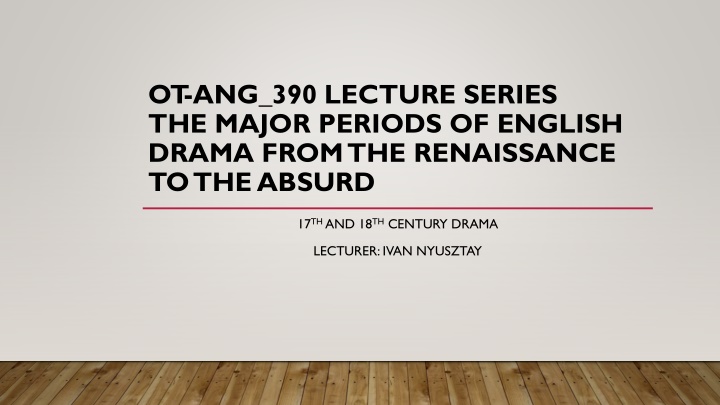
Exploring English Drama: Major Periods and Comparison of Dryden and Shakespeare
Delve into the major periods of English drama from the Renaissance to the Absurd in the 17th and 18th centuries. Learn about the evolution of theatre post-1660, including insights into French classical tragedians and the main topics and subgenres prevalent during this era. Dive into John Dryden's works and compare his approach with that of Shakespeare, analyzing their different focuses and techniques.
Download Presentation

Please find below an Image/Link to download the presentation.
The content on the website is provided AS IS for your information and personal use only. It may not be sold, licensed, or shared on other websites without obtaining consent from the author. If you encounter any issues during the download, it is possible that the publisher has removed the file from their server.
You are allowed to download the files provided on this website for personal or commercial use, subject to the condition that they are used lawfully. All files are the property of their respective owners.
The content on the website is provided AS IS for your information and personal use only. It may not be sold, licensed, or shared on other websites without obtaining consent from the author.
E N D
Presentation Transcript
OT -ANG_390 LECTURE SERIES THE MAJOR PERIODS OF ENGLISH DRAMA FROM THE RENAISSANCE TO THE ABSURD 17THAND 18THCENTURY DRAMA LECTURER: IVAN NYUSZTAY
THEATRE AFTER 1660 1642: London theatres closes 1660: fully restored 1642-1660: theatre in private houses and commercial theatres Puritans were not unanimously opposed to the theatre Women s parts taken by women Composition of public changed: cultivated bourgeoisie, aristocracy
THEATRE AFTER 1660 French classical tragedians: Corneille, Racine as models Neoclassicism: the unities Adapting Shakespeare plays to suit Restauration audiences New sophisticated taste Lacking genuine roots Looking for new directions (cf. Bloom s anxiety of influence)
MAIN TOPICS AND SUBGENRES The heroic play, or tragedy: John Dryden (1631-1700) love and valour, moral Pure tragedy: Thomas Otway (1652-1685) Questioning, blurring the moral Stoic tragedy: Joseph Addison (1672-1719) Senecan influence Domestic tragedy: George Lillo (1691-1739) Moral taught through private woe
JOHN DRYDEN (1631-1700): ALL FOR LOVE: OR, THEWORLD WELL LOST (1677) In my Stile I have profess d to imitate the Divine Shakespeare Shakespeare s Antony and Cleopatra or his source Plutarch? Apologetic preface highlighting innovations Emphasizing the moral The lovers fall is the consequence of their own choice: We make those Fates our selves (Cleopatra) Aureng-Zebe (1676): I m in fate s place, and dictate her decrees (Morat)
DRYDEN VS SHAKESPEARE Dryden: the moral in focus Antony-Ventidius relationship over Antony-Cleopatra s love Ventidius: O Women! Women! Women! all the Gods/Have not such pow r of doing good to Man,/As you of doing harm (2. 517-19) Ventidius confronts Antony with Octavia, his forsaken wife In Shakespeare stronger historical perspective: Caesar, Pompeius, Enobarbus, Eros In Shakespeare: Antony is a valiant warrior, too
DRYDEN VS SHAKESPEARE Shakespeare flouting the unities in Antony and Cleopatra Dryden observes the unities Shakespeare s episodes, subplots, diversions Dryden s main design An Essay of Dramatic Poesy (1668): Shakespeare is ridiculous Adaptation of Troilus s Cressida (1679): I undertook to remove the heap of rubbish, under which many excellent thoughts lay wholly buried.
THOMAS OTWAY (1652-1685): VENICE PRESERV D, ORA PLOT DISCOVERED (1682) Pure tragedy? Popish plot, political sphere Corrupt political leadership of Venice Jaffeir and wife, Belvidera: curses and blessings Tis a raggedVirtue: Honesty! no more on t : blurred moral Plot follows the conspiracy against Julius Caesar: names mentioned Jaffeir: loving husband and conspirator (conspiracy against wife s father) Sparing no Tears when you thisTale relate/But bid all Cruel Fathers dread my Fate.
JOSEPH ADDISON (1672-1719): CATO (1713) Middle-class in the theatre Addison: politician, poet, essayist Cato: only heroic tragedy Heroic ideal: courageous man facing destiny (Senecan) Endurance, perseverance while the state collapses Two conflicting views on Cato: Syphax vs Juba Syphax on Cato: Tis pride, rank pride, and haughtiness of soul:/I think the Romans call it stoicism (1.4.).
CATO THE STOIC Addsion questions the practicality and authenticity of stoicism Cato is relentless until his fall Weeps for Rome, not for his son: How beautiful is death, when earn d by virtue. What pity is it/That we can die but once to serve our country, 4.1. Cato defies all passions and emotions that may hinder rational decisions But: melodramatic flow of tears all through: emphasizing Cato s passionlessness Inconsistencies: I hope my father does not recommend/A life to Portius that he scorns himself, 4.1.
HENRY FIELDING: THE TRAGEDY OF TRAGEDIES OR, THE LIFE AND DEATH OF TOM THUMBTHE GREAT (1731) Hilarious parody of bombastic, sentimental style and Parody of distorted language use and Parody of final justice and rhetorical set pieces of 17-18thc. tragedies Tragedy hath of all writings the greatest share in the bathos Huncamunca orders sad music Entertaining but merciless criticism Tom Thumb: inspired by Swift s Gulliver
OLIVER GOLDSMITH (1728-1774): SHE STOOPS TO CONQUER (1773) 18thc. comedy: linked with Richard Brinsley Sheridan Sentimental comedy: artistically less interesting than sociologically Consequence of the decline of tragedy and the failure of domestic drama Satiric spirit, hit at gentility in the alehouse scene Parody of sober, sentimental interview between lovers Response to decorous neoclassicism with the indecourous, the grotesque and Delight in exposing pretence Fondness for burlesque and parody
